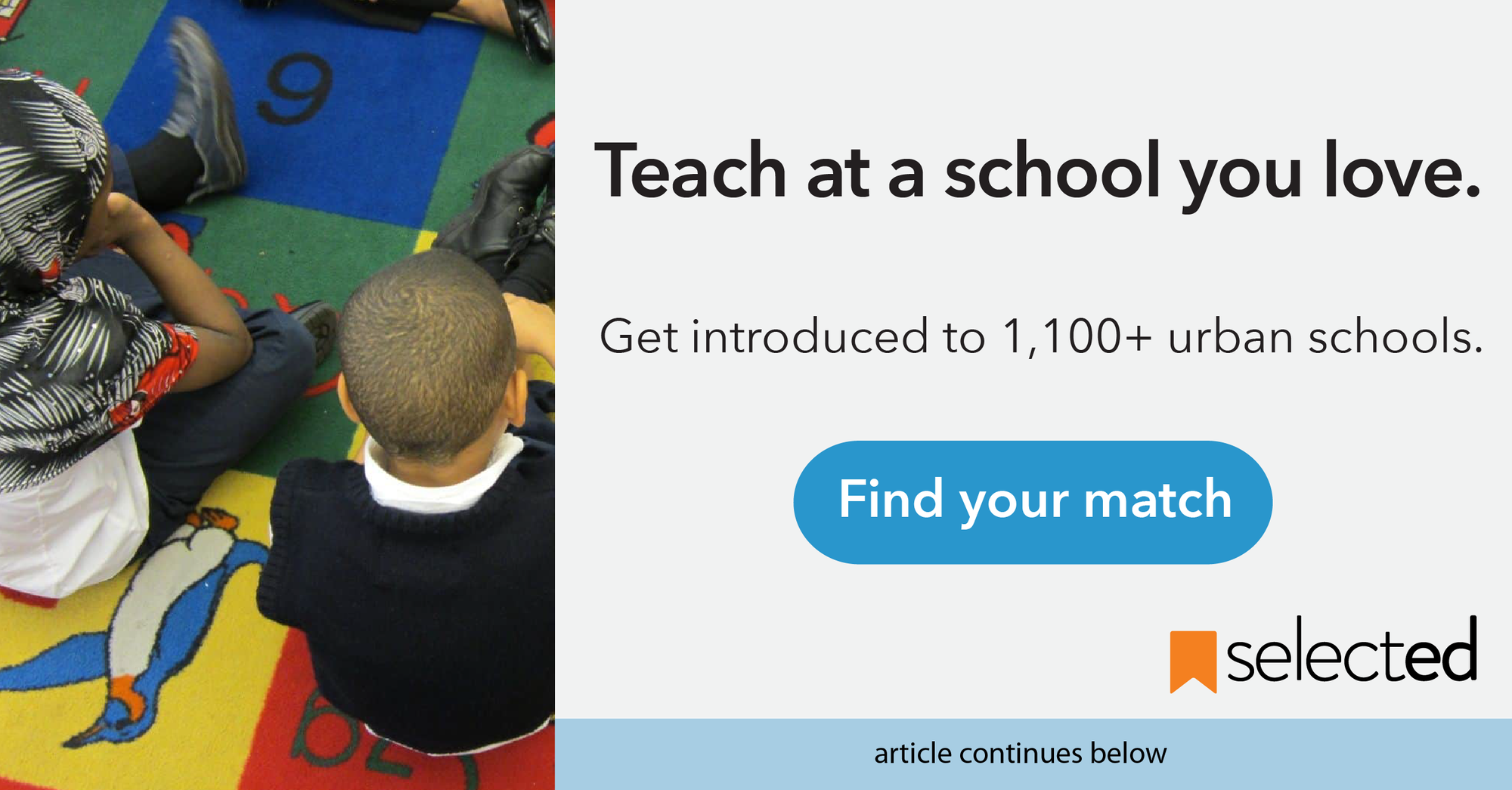What a Former Recruiter Wants Teachers to Know About the Interview Process
Our Director of School Support and Partnerships talks about what he wishes teachers knew about the interview process.

Malcolm Davis, our former Director of School Support and Partnerships, spent several years working in schools and teacher recruitment. This week, he was kind enough to sit down with me and share what he wishes teachers knew about the interview process.
The time between when they submit their resumes and when they get contacted for an interview is a mystery to most people. Who and what’s behind the screening process?
It’s important to know that your resume is reviewed by an actual person, not a machine. When resumes come through, someone typically gives each resume at most a 60 second scan. When they’re doing this scan, they’re looking for basic information like “experience,” “certification,” and “education”.
After someone gives your resume a first look, they’ll pass it onto someone on the recruiting team who specializes in a specific region. Once the regional recruiter looks it over and determines that you could be a good fit, they’ll reach out to you to schedule a phone interview.
Every stage of your interview is handled by a real person — there’s always a human being on the other end of the recruiting process.
So before an interview, most candidates spend a lot of time hyping themselves up and preparing their answers. Do you do anything to prepare before you talk to a candidate? What’s your mindset when you talk to someone new?
Usually I’ll have 4-8 questions I want to ask a candidate, and we usually use the same set of interview questions for each candidate to ensure the process is fair to everyone.
Most recruiters are initially trying to whittle down anyone who would be a waste of time (on both ends). We’re all trying to look through resumes to make sure all the basic requirements like previous experience or education are all there. We’ll also look at career changes and use that information to ask probing questions.
Since I worked at a charter school, I check whether the candidate has had experience teaching in that environment and what grade levels or content they’ve already taught.
In terms of mindset, I try to stay open-minded — while it’s true that there are certain things we look for in terms of experience, sometimes people will impress me in ways you can’t see on a resume.
Are there any questions you value more than others?
I usually ask about how candidates receive feedback and how they implement it going forward. This one was important to me because it shows how well teachers work with school leaders to improve and how they responded to coaching.
Mission alignment is another BIG one. Since a lot of charter schools serve high-need populations in low-income neighborhoods, I wanted to make sure teachers I brought in to interview were committed to the school’s mission and knew what it meant to teach there. At the end of the day, mission alignment equals retention; teachers who were excited about the school’s mission were better fits overall.
Who are a few people who really impressed you? What made them stand out?
There was one woman who was a college lacrosse player who really knocked it out of the park. In our initial phone screen, she was very honest and articulate about the fact that she struggled her freshman year with balancing school and lacrosse,and that had lowered her GPA. She was also clearly very excited about transitioning into teaching, and knew her stuff about our school — she commanded the conversation and demanded my attention despite the fact that she wasn’t perfect on paper, or a career educator.
When it came to teaching the demo lesson, she did a great job. And when the principal gave her feedback and asked her to incorporate it into the lesson again, she did it with no problem over and over again. Out of five candidates we saw that day, she was the only person who got the offer right away.
There was another guy who didn’t jump out on the phone interview, but his in-person interview was amazing. He was able to incorporate feedback and hit it every time exactly how he was asked to, and was so self-reflective and open to coaching.
As recruiters, we’re not expecting perfection — we’re looking for certain qualities that show you’re coachable and willing to improve.
Are there any personal qualities you look for when you interview teachers?
Energy is a big one. Energy equates excitement; you need to show you’re excited about the opportunity to teach at our school and for the opportunity you showed up for, because it resonates well with school managers and leaders.
Energy also helps you command respect and attention. Your students can’t afford to be off-track for an entire class, so if you can’t show energy, you probably won’t be able to lead them through an entire lesson effectively.
Humility is also important. You need to show that you’re humble enough to know your weaknesses and how you can improve.
There was one 7th grade history teacher who came in to interview who absolutely crushed his demo lesson — his energy was on point, he knew his stuff, and he got a standing ovation from the kids. Even though his lesson was good, he cost himself the job during the debrief — he talked over the principal, wouldn’t take feedback, and was so hard to communicate with that the principal cut the debrief short.
Sometimes the most talented people don’t get the opportunities they want — humility goes a long way.
Are there any red flags that jump out during the interview process?
On an initial resume screen, job jumpers are a red flag. If someone can’t commit to a school or school district for more than a year or has left a job after just a few months, I worry about whether they are good long-term hires.
Inability to receive feedback is also a big red flag. Schools are usually looking for someone who is coachable and malleable enough to fit into organization well — if more teachers were open to to process of receiving feedback, then I think more teachers would be hired.
What’s something you want teachers to know?
-
Don’t dictate the process. You’re not going to change an organization to fit your style or to march to your beat because THEY are in control of the opportunity you want. If an organization operates so differently from you, it’s not the right fit for you.
-
Have common sense. Basic things like smiling, giving a strong handshake, wearing appropriate attire, and showing up early (but not more than 15 minutes early!) all matter. You’d be surprised how many people don’t do these basic things and cost themselves a great opportunity.
-
Perfection is not the goal. Schools are usually looking for someone who is coachable to fit into organization well. Humility is also important. You need to show that you’re humble enough to know your weaknesses and how you can improve.
-
Energy is important. I’ve mentioned this before, but show that you’re excited to interview with a school. Being energetic doesn’t mean that you’re frenetic — it just means showing enthusiasm and being happy to talk to us.
Want to learn more about what's behind the interview process? Do you have questions for Mal? Let us know! Email us at hello@getselected.com
About Mal
Malcolm Davis is the former Director of School Support & Outreach at Selected. He spent time as both a Selection and Outreach Recruiter at Uncommon Schools. Mal is also an AmeriCorps alumni, having served as a Teaching Fellow and Deputy Campus Director for Citizen Schools New York. He is passionate about urban education reform, and works diligently to empower communities of color.
About Selected
Selected helps teachers find schools they love. We offer a free school matching and career support platform for educators that connects them with 1,200+ PK-12 public and independent schools in urban metro areas in the Northeast and West Coast, including New York City, NJ, CT, Philadelphia, Washington DC, Boston, and Los Angeles. Create a FREE profile and start speaking with hiring schools immediately!





